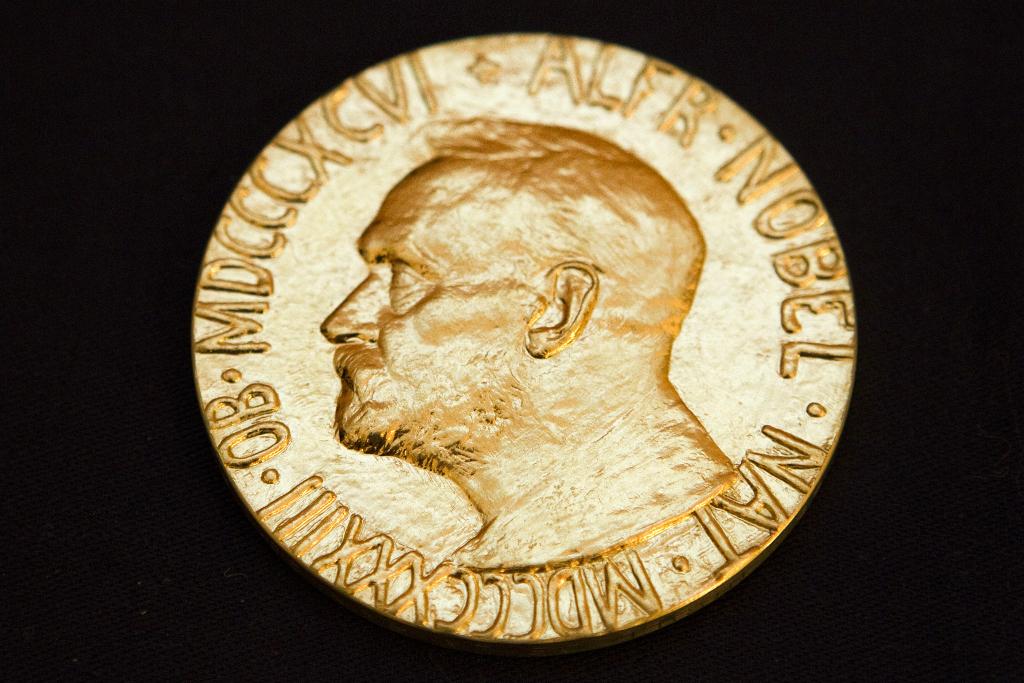10 refugees who changed the world
This picture taken on December 10, 2010 shows the front of the Nobel medal.
Today, there are more than 45.2 million refugees — the most since 1994.
The lives of many refugees are forever changed by the conflicts and wars they escape. However, it's not all so bleak. Plenty have gone on to have a major impact and create positive legacies in their new communities.
Here's a list of 10 people who escaped some of the world's worst violence but went on to have their brilliance and leadership recognized by a Nobel Prize.
Conflict: World War II (1939 – 1945)
![]()
Like thousands of other families destined to become displaced a French family flees the German offensive in May 1940.. AFP/Getty Images.
Henry Kissinger: After fleeing Nazi Germany, Kissinger eventually served as the National Security Advisor under Presidents Nixon and Ford. Kissinger, along with Le Duc Tho, was awarded the Nobel Peace Prize in 1973 for his work in negotiating the withdrawal of US forces from Vietnam.
Elie Wiesel: A survivor of the Holocaust, Elie Wiesel went on to describe his experiences in dozens of books, including the best-seller Night. In 1986 he was awarded the Nobel Peace Prize for his “practical work in the cause of peace.”
Albert Einstein: After fleeing Nazi Germany, and leaving behind an illustrious career, Einstein became the one of the world's, and history's, most famous scientist. In 1921 he was awarded the Nobel Prize in Physics “for his services to theoretical physics, and especially for his discovery of the law of the photoelectric effect.”
Leo Hurwwicz: Born into a family seeking refuge from World War I, Hurwicz had to flee himself as an adult during World War II. A gifted mathematician and economist, Hurwicz was awarded the Nobel Prize in Economics in 2007 “for having laid the foundations of mechanism design theory.”
Robert Aumann: An Israeli-American mathematician, Aumann arrived in the US in 1938 just before the start of the Kristallnacht pogrom. He was awarded the Nobel Prize in Economics in 2005 for “having enhanced our understanding of conflict and cooperation through game-theory analysis.” Aumann named his Nobel acceptance speech “War and Peace.”
Elias Canetti: A Bulgarian novelist, Canetti fled Germany after the annexation of Poland in 1938, settling in London. From there he continued to write modernist literature in German. He was awarded the Nobel Prize in Literature in 1981 “for writings marked by a broad outlook, a wealth of ideas and artistic power.”
Bernard Katz: Katz and his family fled Germany in 1935, before the onset of WWII, to Britain. For his special research on nerve biochemsitry, Katz, along with Julius Axelrod and Ulf von Euler, was awarded the 1970 Nobel Prize in Medicine — specifically “for [his] discoveries concerning the humoral transmittors in the nerve terminals and the mechanism for their storage, release and inactivation.”
Conflict: Hungarian Revolution (1956)
![]()
Atop a Soviet tank citizens wave the Hungarian flag on November 12, 1956. Soviet troops soon squashed the protests and sent many into displacement. AFP/Getty Images.
George Andrew Olah: Olah and his family fled Hungary in 1956. In 1971, he became a citizen of the US. His “contribution to carbocation chemistry” was recognized in 1994 when he won the Nobel Prize in Chemistry.
Conflict: Guatemalan Civil War (1960 – 1996)
![]()
An indigenous woman and her children listen to the speech of Rolando Moran, one of the four commanders of the Guatemalan National Revolutionary Unity, the day after the peace accord ending 36 years of civil war was signed. Jorge Unzo/AFP/Getty Images.
Rigoberta Menchu: After her father was killed in Guatemala's brutal civil war, Menchu was exiled to Mexico in 1981, where she grew to become a world-recognized advocate for the rights of indigenous Guatemalans. Menchu was awarded the Nobel Peace Prize in 1992, “in recognition of her work for social justice and ethno-cultural reconciliation based on respect for the rights of indigenous peoples.”
Conflict: Tibetan Uprising (1959)
![]()
After an unsuccessful uprising against Chinese rule in 1959 Tibetans lay down their arms and begin the arduous journey into exile. AFP/Getty Images.
Dalai Lama: For his strident commitment to the “struggle of the liberation of Tibet and the efforts for a peaceful resolution,” the Dalai Lama was awarded the Nobel Peace Prize in 1989. He has remained in exile in India since 1959.
We want to hear your feedback so we can keep improving our website, theworld.org. Please fill out this quick survey and let us know your thoughts (your answers will be anonymous). Thanks for your time!
